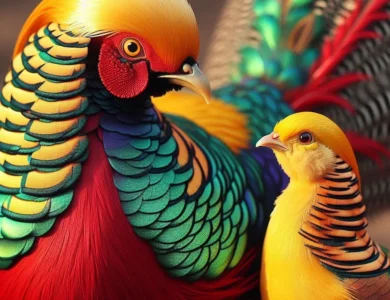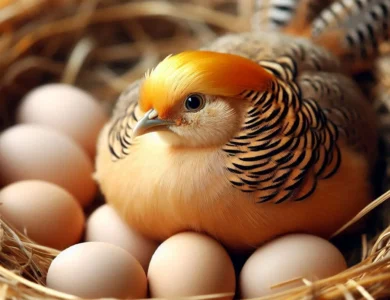Are Golden Pheasants Smart?

Introduction
Golden pheasants are striking birds known for their vibrant plumage and unique appearance. While their beauty is undeniable, you might wonder about their intelligence. This article will explore the cognitive abilities of golden pheasants, examining various aspects of their behavior and comparing them to other bird species.
Understanding Bird Intelligence
What Makes a Bird Smart?
Before diving into the specifics of golden pheasant intelligence, it’s important to understand what we mean by “smart” when it comes to birds. Bird intelligence can be measured in various ways, including:
- Problem-solving abilities
- Memory and learning capacity
- Tool use
- Social intelligence
- Adaptability to new environments
Comparing Bird Intelligence
When assessing the intelligence of golden pheasants, it’s helpful to compare them to other bird species. Some birds, like corvids (crows, ravens, and magpies) and parrots, are known for their high intelligence. Others, like chickens, are often considered less intelligent. Where do golden pheasants fall on this spectrum?
Golden Pheasant Behavior
Natural Habitat and Lifestyle
Golden pheasants are native to the mountainous forests of central and southern China. In the wild, they spend most of their time on the ground, foraging for food and navigating through dense undergrowth. This lifestyle requires certain cognitive abilities to survive and thrive.
Foraging Behavior
Golden pheasants are omnivores, eating a variety of foods including:
- Seeds
- Berries
- Leaves
- Insects
- Small invertebrates
Their foraging behavior can give us insights into their problem-solving abilities and memory. For example, do they remember where food sources are located? Can they adapt their foraging strategies based on seasonal changes?
Social Behavior
While not as social as some bird species, golden pheasants do exhibit interesting social behaviors, particularly during mating season. Males perform elaborate courtship displays to attract females, which requires a certain level of social intelligence and communication skills.
Cognitive Abilities of Golden Pheasants
Problem-Solving Skills
To assess the problem-solving abilities of golden pheasants, researchers have conducted various experiments. One study involved presenting the birds with food hidden inside puzzle boxes. The pheasants were observed to see if they could figure out how to access the food.
Results showed that golden pheasants were able to solve simple puzzles, but struggled with more complex ones. This suggests a moderate level of problem-solving ability, though not as advanced as some other bird species.
Learning and Memory
Golden pheasants have demonstrated decent learning and memory capabilities. In captivity, they can learn to recognize their caretakers and associate them with food. They also show the ability to remember the location of food sources and potential threats in their environment.
However, their learning speed and memory retention are not as impressive as those of corvids or parrots. Golden pheasants typically require more repetitions to learn new tasks and may not retain information for as long.
Adaptability
One area where golden pheasants show promise is in their adaptability. These birds have successfully established populations in various parts of the world outside their native range, including:
- The United Kingdom
- Parts of Europe
- North America
This ability to adapt to new environments suggests a certain level of cognitive flexibility and problem-solving skills.
Tool Use
Unlike some bird species, such as New Caledonian crows or Egyptian vultures, golden pheasants have not been observed using tools in the wild or in captivity. This lack of tool use doesn’t necessarily indicate low intelligence, but it does suggest that their cognitive abilities may be more specialized for their particular ecological niche.
Comparing Golden Pheasants to Other Pheasant Species
Common Pheasants
Common pheasants, close relatives of golden pheasants, have been more extensively studied. Research has shown that common pheasants possess:
- Spatial memory for food caches
- The ability to learn from each other
- Problem-solving skills in foraging contexts
Golden pheasants likely share many of these cognitive traits with their common pheasant cousins, though more research is needed to confirm this.
Lady Amherst’s Pheasant
Another close relative of the golden pheasant is the Lady Amherst’s pheasant. These birds share similar habitats and behaviors with golden pheasants. Comparative studies between the two species could provide valuable insights into their relative cognitive abilities.
Challenges in Studying Golden Pheasant Intelligence
Limited Research
One of the main challenges in assessing golden pheasant intelligence is the limited amount of research specifically focused on their cognitive abilities. Most studies on pheasant intelligence have centered on more common species, leaving gaps in our understanding of golden pheasants.
Captive vs. Wild Behavior
Much of what we know about golden pheasant behavior comes from observations of captive birds. However, captive environments may not fully reflect the cognitive demands faced by wild golden pheasants. This discrepancy could lead to underestimating or misunderstanding their true intellectual capabilities.
Anthropocentric Bias
When studying animal intelligence, it’s important to avoid anthropocentric bias – the tendency to judge animal intelligence based on human standards. Golden pheasants may possess specialized forms of intelligence that are difficult for humans to recognize or measure.
The Role of Intelligence in Golden Pheasant Survival
Predator Avoidance
In their natural habitat, golden pheasants face various predators, including:
- Birds of prey
- Small mammals
- Larger reptiles
Their ability to avoid predators requires a certain level of intelligence, including:
- Recognizing potential threats
- Remembering safe hiding spots
- Making quick decisions under pressure
Foraging Efficiency
Efficient foraging is crucial for survival, especially in environments where food sources may be scarce or seasonal. Golden pheasants need to:
- Remember the location of food sources
- Recognize edible items
- Adapt their foraging strategies based on availability
These skills all require cognitive abilities that contribute to the overall intelligence of the species.
Mating Success
The elaborate courtship displays of male golden pheasants suggest a level of social intelligence. Successful mating requires:
- Recognizing potential mates
- Performing complex displays
- Competing with other males
- Timing displays for maximum effect
While these behaviors are largely instinctual, they also involve learning and adaptation, which are hallmarks of intelligence.
Human Interactions with Golden Pheasants
Aviculture and Captive Breeding
Golden pheasants are popular in aviculture due to their striking appearance. Breeders and keepers of these birds often report on their behavior and perceived intelligence. While these observations are not scientific, they can provide valuable anecdotal evidence about golden pheasant cognition.
Some keepers report that golden pheasants can:
- Recognize individual caretakers
- Learn simple commands or routines
- Show preferences for certain foods or enrichment activities
Conservation Implications
Understanding the intelligence of golden pheasants has important implications for conservation efforts. If these birds are more intelligent than previously thought, it could influence:
- Habitat protection strategies
- Captive breeding programs
- Reintroduction efforts
For example, if golden pheasants show high adaptability and problem-solving skills, they might be better equipped to handle changes in their environment due to human activities or climate change.
Recent Research and Findings
Cognitive Testing in Pheasants
While specific studies on golden pheasant intelligence are limited, recent research on related pheasant species has provided some interesting insights. A study published in the journal “Animal Cognition” in 2020 examined problem-solving abilities in common pheasants.
The researchers found that pheasants could learn to solve simple puzzles to access food rewards. Interestingly, they also observed individual differences in problem-solving abilities, suggesting that some pheasants may be “smarter” than others within the same species.
Spatial Memory in Pheasants
Another area of recent research has focused on spatial memory in pheasants. A study published in “Applied Animal Behaviour Science” in 2019 investigated the ability of pheasants to remember the location of food sources.
The results showed that pheasants could remember the location of food for several days, even when the visual cues were removed. This suggests a level of cognitive mapping ability, which is an important aspect of animal intelligence.
Evolutionary Perspectives on Golden Pheasant Intelligence
Ecological Pressures
The intelligence of golden pheasants, like that of all species, has been shaped by evolutionary pressures. The specific challenges faced by these birds in their native habitats have likely influenced their cognitive development.
Some factors that may have shaped golden pheasant intelligence include:
- The need to navigate complex forest environments
- Seasonal changes in food availability
- Predator pressures
- Competition for mates
Comparison with Other Galliformes
Golden pheasants belong to the order Galliformes, which includes chickens, turkeys, and quails. Comparing the intelligence of golden pheasants to other members of this order can provide insights into their evolutionary development.
In general, Galliformes are not considered to be among the most intelligent bird orders. However, there is significant variation within the group, and golden pheasants may possess cognitive abilities that set them apart from their relatives.
Implications for Captive Care
Enrichment Needs
Understanding the intelligence of golden pheasants has important implications for their care in captivity. If these birds are more cognitively advanced than previously thought, they may require more complex forms of environmental enrichment to thrive.
Potential enrichment activities for golden pheasants could include:
- Puzzle feeders that challenge their problem-solving abilities
- Varied and changing environments to stimulate their adaptability
- Social interactions with conspecifics or even human caretakers
- Training sessions to engage their learning capabilities
Ethical Considerations
As we learn more about the cognitive abilities of golden pheasants, it raises ethical questions about their captivity and use in various human activities. If these birds possess higher levels of intelligence and self-awareness than previously believed, it may necessitate a reevaluation of how we interact with and care for them.
Future Research Directions
Comparative Studies
To better understand golden pheasant intelligence, more comparative studies are needed. These could include:
- Direct comparisons with closely related species like Lady Amherst’s pheasant
- Broader comparisons with other Galliformes and more distantly related bird orders
- Investigations into potential differences between wild and captive golden pheasants
Advanced Cognitive Testing
Future research could employ more advanced cognitive testing methods to assess golden pheasant intelligence. Some potential areas of investigation include:
- Mirror self-recognition tests to explore self-awareness
- Delayed gratification experiments to test impulse control
- Social learning studies to examine cultural transmission of behaviors
- Tool use experiments to challenge problem-solving abilities
Neurobiological Studies
Advances in neurobiology could provide new insights into golden pheasant intelligence. Studies of brain structure and function in these birds could reveal:
- The size and complexity of brain regions associated with higher cognition
- Neural pathways involved in learning and memory
- Comparisons of brain structure with other bird species
Conclusion
Summarizing What We Know
Based on the available evidence, we can draw some tentative conclusions about golden pheasant intelligence:
- Golden pheasants show moderate problem-solving abilities, though not as advanced as some other bird species.
- They possess good spatial memory, particularly for food sources.
- Their adaptability to new environments suggests a level of cognitive flexibility.
- Social behaviors, especially during mating, indicate some degree of social intelligence.
- While not known for tool use, they may possess other specialized forms of intelligence suited to their ecological niche.
Acknowledging Uncertainty
It’s important to note that our understanding of golden pheasant intelligence is still limited. More research is needed to fully assess their cognitive abilities and compare them accurately to other bird species.
The Bigger Picture
Studying the intelligence of golden pheasants is not just about satisfying scientific curiosity. It has important implications for:
- Conservation efforts
- Captive care practices
- Our broader understanding of avian cognition and evolution
As we continue to explore the cognitive world of these beautiful birds, we may find that they are more intelligent than we initially thought, challenging our perceptions and expanding our appreciation for the complexity of animal minds.
FAQs About Golden Pheasant Intelligence
How smart are golden pheasants compared to other birds?
Golden pheasants show moderate intelligence compared to other bird species. They’re not considered as smart as corvids (crows and ravens) or parrots, but they likely possess higher cognitive abilities than some other game birds. Their intelligence seems well-suited to their specific ecological niche.
Can golden pheasants be trained?
Yes, golden pheasants can be trained to some extent. In captivity, they can learn to recognize their caretakers and associate them with food. They can also learn simple routines or commands, though they may not be as trainable as some other bird species.
Do golden pheasants use tools?
There’s no evidence of tool use in golden pheasants, either in the wild or in captivity. However, the absence of tool use doesn’t necessarily indicate low intelligence, as many intelligent animals don’t use tools.
How good is a golden pheasant’s memory?
Golden pheasants have demonstrated good spatial memory, particularly for food sources. They can remember the location of food for several days, even when visual cues are removed. However, their overall memory capabilities may not be as advanced as some other bird species.
Are some golden pheasants smarter than others?
Like many animals, there’s likely individual variation in intelligence among golden pheasants. Some individuals may show better problem-solving skills or learning abilities than others. This variation is an important aspect of natural selection and evolution.
How does the intelligence of golden pheasants compare to their close relatives?
Golden pheasants likely share many cognitive traits with their close relatives, such as common pheasants and Lady Amherst’s pheasants. However, more comparative research is needed to fully understand the similarities and differences in intelligence among these species.
Can golden pheasants recognize individual humans?
In captivity, golden pheasants can learn to recognize their regular caretakers. This recognition is likely based on visual cues and associated with positive experiences like feeding.
How does the intelligence of golden pheasants affect their survival in the wild?
The intelligence of golden pheasants plays a crucial role in their survival. It helps them avoid predators, find food efficiently, and navigate their complex forest environments. Their ability to adapt to new environments also suggests that their intelligence contributes to their resilience as a species.
Are there any unique cognitive abilities that golden pheasants possess?
While golden pheasants may not have any unique cognitive abilities that we know of, they likely possess specialized forms of intelligence that are well-adapted to their specific ecological niche. This could include advanced spatial navigation skills or the ability to remember seasonal food sources.
How can I challenge my pet golden pheasant’s intelligence?
If you keep golden pheasants as pets, you can provide mental stimulation through:
- Puzzle feeders that require problem-solving to access food
- Changing the layout of their enclosure regularly to encourage exploration
- Providing a variety of perches and hiding spots
- Offering different types of food to encourage foraging behaviors
Remember, any enrichment activities should be appropriate for the species and approved by a veterinarian or avian expert.




